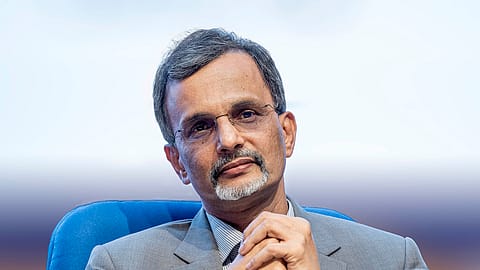‘Situation will ease in 1-2 quarters’: CEA Nageswaran on Trump’s tariff woes, but urges India Inc. to ‘do more’
With India under the hammer of Trump’s steep tariffs, the Chief Economic Advisor comments exude confidence that the uncertainty is only short-term and the focus should be realigned to bigger, long-term impediments

As U.S. President Donald Trump’s tariffs continue to jolt India with the uncertainty that it is wreaking, the turbulence might only be near-term. According to V. Anantha Nageswaran, India’s chief economic advisor (CEA), the tariff-related hurdles are expected to dissipate in the next one or two quarters, news agency PTI quoted him as saying on Wednesday.
At the same time, Nageswaran exhorted the private sector to do more as the country finds itself navigating through other long-term challenges. “I do believe that the current situation will ease out in a quarter or two. I don’t think that from a long-term picture, the India impact will be that significant, but in the short run, there will be some impact,” he said, as quoted by PTI.
The CEA said that it is the second and third-order impacts, which will prevail, once sectors like jewellery and gems, textiles, and shrimps have taken the first-order brunt, that will be “more difficult” to cushion. Nageswaran said that the government is apprised of the situation and dialogue with the affected sectors has already begun. He also added that one can expect from policymakers in the coming days, but people ought to be patient.
Nageswaran said the course of the future talks with the U.S. for a trade deal—with speculation rife of U.S. officials visiting India next month—is contingent on the upcoming meeting in Alaska between U.S. President Donald Trump and his counterpart, Vladimir Putin.
He also said that it is improbable to guess the exact reasons that culminated in Trump imposing harsh tariffs on India. Nevertheless, the CEA said that the issue of tariffs should not blind India to more “important challenges”, including the impact of artificial intelligence, reliance on one country for critical minerals, and strengthening supply chains.
In his exhortation to the private sector, the CEA said that public policy will play the facilitator’s role. “Private sector also has a lot of thinking to do, given the massive strategic challenges we face in the coming years... the private sector also has to think about the long-term rather than the next quarter, which is what might have led to many of the challenges we are currently beginning to face,” he said, not elaborating on the subject any further.